This article was co-authored by Elsie Glasu-Atunuwa. Elsie Glasu-Atunuwa is a West African Chef and the Founder of Trices Cafe and Lounge in San Antonio, Texas. Elsie learned to cook from her mother, using only the finest ingredients to create great flavors. Her mother’s training and her own imagination allow her to create delicious traditional West African dishes to satisfy customers, friends, family, and colleagues. Her team specializes in serving dishes from Nigeria, Ghana, and Cameroun. They also offer catering for all occasions. Elsie studies General Science and holds a doctorate degree in Nursing from Grand Canyon University.
This article has been viewed 135,612 times.
Fufu is a popular and staple food in the Caribbean and West Africa, particularly Ghana, DRC and Nigeria. It’s made by mixing yams and other starchy vegetables with hot water to make a dough-like mash. There are many different ways to make fufu, and the ingredients and method depend on the region of origin. But traditionally, all types of fufu are eaten with soups, stews, and saucy dishes, and you eat it by breaking pieces off and using them to scoop up bites of your main dish.
Ingredients
- 4 cups (948 ml) water
- 2 cups (340 g) fine corn meal
- 1 teaspoon (6 g) salt
- 1 sweet cassava
- 1 plantain
- 2 cups (334 g) ground semolina
- 2 cups (318 g) ground rice
- 6 cups (1.42 L) water
Steps
Corn Fufu
-
1Boil the water. Corn fufu, also called ugali, is one of the many types of fufu that you can make. As the name suggests, it’s made by combining boiling water and corn, in the form of cornmeal.
- Add the full amount of water to a large, heavy-bottomed saucepan. Add the salt, and bring the water to a boil over medium heat.
- When the water boils, remove 1 cup (237 ml) of the water and set it aside. Keep the rest of the water on the heat.
-
2Add the cornmeal and reduce the heat. Slowly pour the cornmeal into the pot of water, whisking constantly as you add it. Once all the cornmeal has been added and incorporated, switch to a wooden spoon and continue stirring the mixture.[1]
- Once all the cornmeal has been stirred in, turn the heat to low.
Advertisement -
3Stir constantly until the mixture thickens. Stir the cornmeal vigorously with the wooden spoon to prevent it from burning. If any lumps form, remove the pan from the heat momentarily to stir out the lumps, then return the pan to the heat.
- As the mixture heats up, the starch in the cornmeal will thicken the mixture. This will take about five to 10 minutes.
- When the mixture is ready, it will start to smell like roasted corn.
-
4Add the remaining water. Once the fufu has thickened, add the reserved cup of water back into the pot. Stir to combine, then put the lid on the pot. Let the fufu cook for 10 to 15 minutes.[2]
- When the cooking time is up, remove the pan from the heat.
-
5Serve warm. Use a ladle or small bowl to portion out the fufu. Use your hands to shape the fufu into a ball before serving.
Cassava and Plantain Fufu
-
1Gather your supplies. To make cassava and plantain fufu, you'll need a large pot for boiling the ingredients, plus a special large-scale pestle and mortar that you'll use to pound the fufu.
- You'll also need a large saucepan, a knife, a bowl, and a ladle or small bowl.
- If you don’t have a large pestle and mortar, you can use a smaller scale one and work in very small batches to make single-serving fufu.
-
2Peel and cut the cassava and plantain. Peel the plantain and cut it into one-inch (2.5-cm) chunks. Cut the cassava into one-inch (2.5-cm) disks. Peel each disk, and then chop the disks into cubes.
- It’s important to use sweet cassava instead of bitter, because bitter cassava requires a different processing method to remove all the harmful cyanogenic glycosides present in the root.[3]
- You can substitute yam for the plantain and cassava in this recipe to make yam fufu. Just make sure you use yam, which has white flesh and brown skin, and not sweet potato, which is sometimes mistakenly called yam.[4]
-
3Boil the cassava and plantain. Fill a large pot with water and bring it to a boil over medium-high heat. When the water is boiling, add the cassava and plantain chunks and bring the water back to a boil.
- Boil the cassava and plantain for about 15 minutes, or until you can easily insert a knife into the flesh.[5]
-
4Drain the water. When the cassava and plantain are cooked and soft, strain them and reserve the water. Either use a slotted spoon to remove the chunks, or place a strainer over a large bowl to catch the water when you strain the chunks.
- The water you used to boil the cassava and plantain now contains starches from both, and you'll use this later to help bring the fufu together.
-
5Mash the plantain. Add the plantain to the mortar one piece at a time. Mash each piece a couple times with the pestle to break down the larger chunks before adding another piece. Repeat until all the plantain pieces have been mashed into a chunky pulp. Continue pounding, and start folding the plantain dough over on itself in between each pound so that you remove all the smaller chunks as well.
- When the plantain is ready, you'll have a smooth dough that’s free of chunks.
- Remove the plantain dough from the mortar and place it in a separate bowl.
- It’s easier to work the large pestle and mortar with two people, where one person concentrates on pounding with the pestle and the other person manages the ingredients in the mortar.
-
6Mash the cassava. Repeat the same process with the cassava. Pound one piece at a time until all the cassava has been mashed. Then fold the dough between each pound to remove all the small chunks.
- When the cassava is ready, it will have the appearance of a smooth, white dough.
-
7Combine the doughs. Return the plantain dough to the mortar. Pound the doughs together with the pestle, folding the dough between each pound to fully incorporate the plantain and cassava.
- If the dough starts to stick, add the reserved starch water in ¼ cup (60-ml) increments.
- The fufu is ready when the two doughs have been fully incorporated and the fufu is soft and fluffy.
-
8Form into balls before serving. Use a ladle or small bowl to portion out the fufu. Work each fufu portion in your hands to form it into a doughy ball before serving.
Rice and Semolina Fufu
-
1Boil the water. In a large heavy-bottomed saucepan, bring the water to a boil over medium heat. It’s important to use a heavy saucepan, because this will help prevent the fufu from burning as it cooks and thickens.
- If you don’t have access to ground semolina and ground rice, you can substitute 2 cups (454 g) each of ready-made baking mix (such as Bisquick) and instant mashed potatoes, plus 2 cups (244 g) of cassava or tapioca flour.
-
2Add the semolina. Slowly pour the semolina into the water, whisking constantly as you do. Once all the semolina has been incorporated, switch to a wooden spoon. Stir constantly for three to four minutes, giving the mixture time to thicken.
- Fufu made in a pot can get quite thick, so you may need to get someone to help you hold the pot while you stir.
-
3Add the rice. Slowly pour the ground rice into the mixture as well, stirring constantly to mix all the ingredients. When all the rice has been stirred in, put on the lid, lower the heat, and let the fufu cook for 10 minutes.
-
4Serve hot. Use a ladle to portion out the fufu, and serve it fresh and hot with your favorite soups and stews.
Expert Q&A
-
QuestionHow do you store fufu?
 Elsie Glasu-AtunuwaElsie Glasu-Atunuwa is a West African Chef and the Founder of Trices Cafe and Lounge in San Antonio, Texas. Elsie learned to cook from her mother, using only the finest ingredients to create great flavors. Her mother’s training and her own imagination allow her to create delicious traditional West African dishes to satisfy customers, friends, family, and colleagues. Her team specializes in serving dishes from Nigeria, Ghana, and Cameroun. They also offer catering for all occasions. Elsie studies General Science and holds a doctorate degree in Nursing from Grand Canyon University.
Elsie Glasu-AtunuwaElsie Glasu-Atunuwa is a West African Chef and the Founder of Trices Cafe and Lounge in San Antonio, Texas. Elsie learned to cook from her mother, using only the finest ingredients to create great flavors. Her mother’s training and her own imagination allow her to create delicious traditional West African dishes to satisfy customers, friends, family, and colleagues. Her team specializes in serving dishes from Nigeria, Ghana, and Cameroun. They also offer catering for all occasions. Elsie studies General Science and holds a doctorate degree in Nursing from Grand Canyon University.
West African Chef Store any extra fufu you have in the refrigerator—then, when you're ready to eat it, take it out. Since it tends to harden up in the refrigerator, cover the fufu with a paper towel, add a little water to it, and reheat it in the microwave.
Store any extra fufu you have in the refrigerator—then, when you're ready to eat it, take it out. Since it tends to harden up in the refrigerator, cover the fufu with a paper towel, add a little water to it, and reheat it in the microwave.
Expert Interview

Thanks for reading our article! If you'd like to learn more about making fufu, check out our in-depth interview with Elsie Glasu-Atunuwa.
References
About This Article
Fufu is a popular Caribbean and West African food. To make corn fufu, start by boiling 4 cups of water in a pot, add 1 teaspoon of salt, and remove 1 cup of the water for later. Then, add 2 cups of fine corn meal and reduce the heat. Keep stirring the pot for 5 to 10 minutes until the mixture turns thick. Once the fufu has thickened, add the cup of water back, stir it in, and leave the pot to simmer for another 10 to 15 minutes. When the fufu is cool enough to touch, shape it into balls and serve it. To make fufu with rice and semolina, bring 6 cups of water to boil in a pot, add 2 cups of ground semolina, and stir for a few minutes until it thickens. Then, pour in 2 cups of rice, reduce the heat, and cook the fufu for 10 minutes. Serve it with your favorite soup or stew. For more tips, including how to make fufu with cassava and plantain, read on!
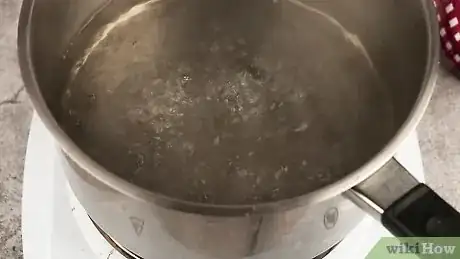
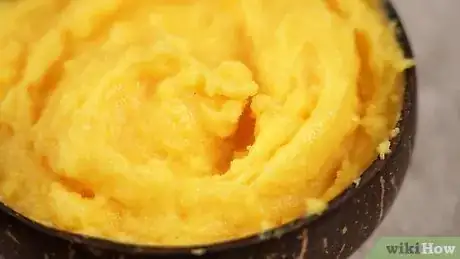
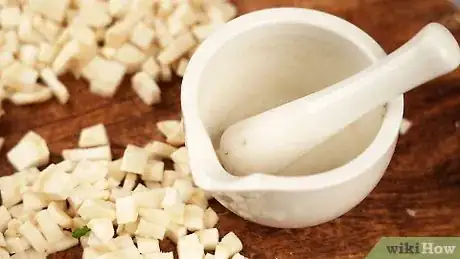
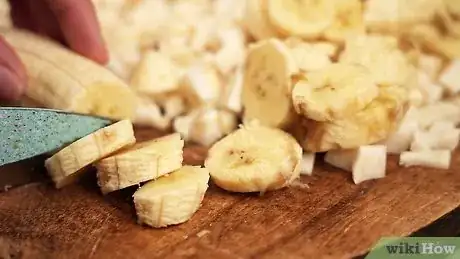
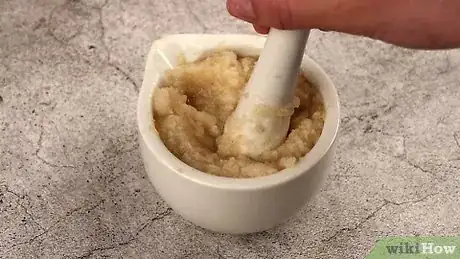
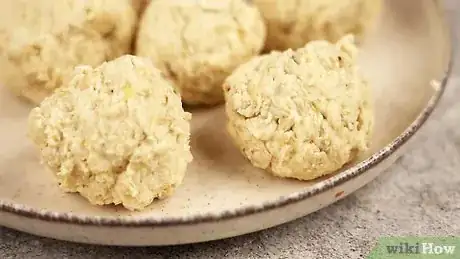
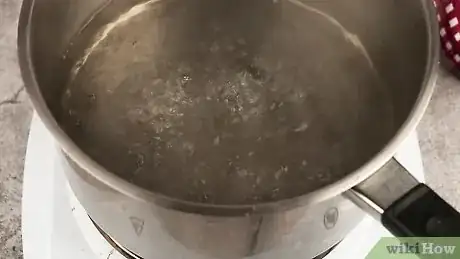
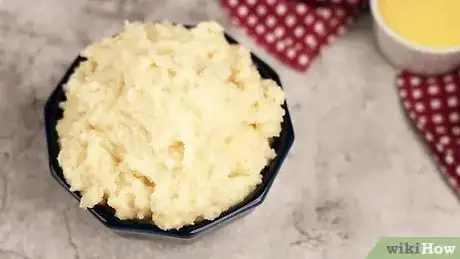

-Final.webp)
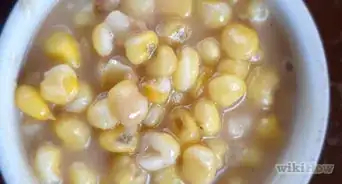




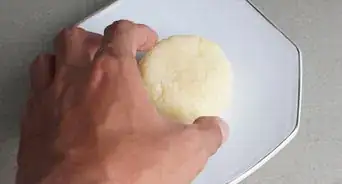
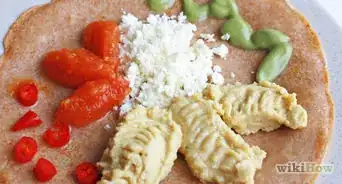












-Final.webp)



































